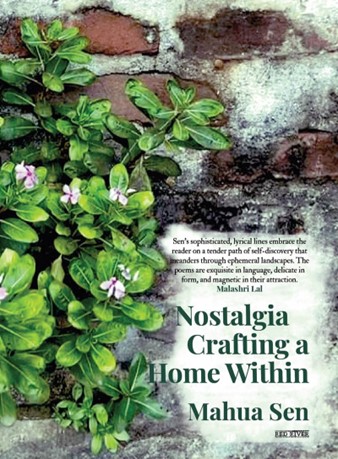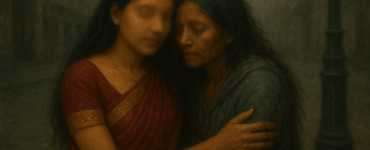The Durga puja, the annual ritual of homecoming of our Mother Goddess from the heavenly mountain abode of Kailash to our own sweet earthen realm, and the ‘Subho Bijoya’ rituals that follow as an aftermath of her departure makes a Bengali by heart wistful as reminiscences of the home left behind seven seas and thirteen rivers apart rush in the mind’s sprawling corridors, keep swishing to and fro in their haywire rhythm. In such a wistful state of mind, I picked up a book of poems, ‘Nostalgia Crafting a Home Within’ or rather, remarkable memorabilia documenting the elements of a sensitive poet’s inner world, her sacred sanctum sanctorum.
I had read some poems in the collection a few months before, after coming back from Kolkata, India, where I had the privilege to read a few lines from her deeply layered poems during the book launch as a speaker/panelist, but now with a freshly pining heart that strives to dissect the meaning and essence of ‘home’, far away from my original homeland, India, I started to read the poems in their chronological order and started to feel the pulse and the echoes of the cracks and the crevices of the heart as well as the tranquil poetic emotions that gave birth to each poem in the collection.
When the tender heart aches for the turbulent waves of the times gone by, the luscious web of imagination, curiosity and childlike awe-and wondrous strings of nostalgia tugs at the heartstrings, a book of poems and prose-poems imbued with sunshine and dusky twilight in equal measures, ‘Nostalgia Crafting a Home Within’ by accomplished poetess Mahua Sen is born.
The very first poem, a prose poem titled ‘Echoes of a Fragmented Past’ brings home to the readers the essence of a poet’s heart torn between ‘bittersweet yearning’ and ‘a haunting refrain’ of unfiltered days of yore, as her pen oozes out her aching reflections in such lines: “In the depths of Delhi’s wintry pallor, words hang in the air, monosyllabic ghosts whispering in tongues. I run, a fugitive from memories or perhaps from myself, the enigma of it all…I run, swifter and swifter, chasing shadows and spectres.” In these lines, a strange, surreal connection, a sort of déjà vu was formed deep within my senses as in my own writing, I have always struggled with this relentless oscillation between the checkered memories of my past and the various acquired truths, the myriad syllables of my present, the life in continuum.
As a poet deeply attached to the people in her immediate family and the various physical spaces or surroundings that have defined her persona, Mahua Sen’s poems also breathe in the lingering aroma of family legacy and the metaphorical truths of human bondage. In her poem titled ‘Grandmother’, her scintillating last lines: “Her lap, a sanctuary from life’s tempestuous climb,/ Basking in the warm hues of nostalgia’s tender tears,/ Chasing memories like the cherished verses of a timeless rhyme” and the other abiding images she builds in the sonnet speaks about not only the rich visual magic of memories, but also about how the urgency of personal emotions constitutes of universal truths. Similarly, in her prose-poem ‘Grandfather’, one stumbles upon not only images which she meticulously builds, depicting the feeling of personal loss upon reflecting on her pain and trauma of losing a beloved grandfather, but also upon images that conjure vivid recollections of ‘those days of yore’ for which she also pines. “There, we would perch ourselves upon the wooden ‘chauki’, listening to Dada’s Murphy radio as it serenaded us with Rabindra Sangeet. At times, we would rush outside, toothbrushes in hand, to observe the housemaids tending to the cattle.”
Also, in the poem titled ‘My Hometown Forbesganj’, yet again a prose-poem, her rhetoric of nostalgia is at full play as she weaves her memories married to her imagination in these lines, and also weaves in her poetic insight, recognizing her true self while flirting with the tangled web of her reminiscences of girlhood: “Here, I conjure childhood in the palm of my hands and love dances within the chambers of my heart, its rhythm a soothing lullaby…In this land, I feel whole in my own stories, a profound sense of self. It’s a sanctuary of love, as pure as the shiuli flowers bowing in my front yard.
With such intimate, vivid language and the rhetoric of nostalgia, combined with artistic black and white photographs of herself, her family members and also some symbolic images, the poet weaves her childhood and recreates old, rusty memories to metamorphose them into pieces of moving literature.
Though in my own understanding, the primary point-of-view of the poet in the collection is that of crafting the path of self-discovery “that meanders through ephemeral landscapes”, both the physical and her inner/psychological landscape, in author and renowned academician Malasri Lal’s words, some of her poems in the collection also derive their strength and succor in the revelation of a strong feminine subjectivity. In her very poignant poem ‘Charulata’, Sen employs the luscious feminine consciousness along with the vulnerable, yet enigmatic frothing up of her passion, her invincible love. “In your absence, everything has turned into varying shades of grey. Your words linger upon me, like raindrops suspended on my beloved malati plant, teetering on the edge of release, yet reluctant to let go.” She writes in the poem, lines imbued with an intense sense of pathos with is at the core of her femininity. In the same breath, in her poem titled ‘Hiraeth’, it is the voice of her womanly beauty embedded with the body and soul of the river Hiraeth, as she writes: “Finally I found you;/and we walked for a mile, by the river/fingers entwined, soaked in an unspoken vow/ironing out each other’s rough edges.” There is a sense of tranquil, yet strong undercurrent of her feminine identity in the lines, but at the same time, a splish-splashing wave of nostalgia sweeping up her consciousness with its lingering essence: “My ashen shadow’s crimson tears/soak the epigrammatic fragility of the night.” Here, I paused to think how effortlessly her femininity merged with the metaphors of desolation, depicted in the fragmented images of the river.
In her gorgeous afterword in the collection, Dr. Santosh Bakaya makes these very eloquent and memorable statements regarding the power of Mahua’s poetry and also the intrinsic quality of her voice: “Tinged with nostalgia, love, longing, hurt, bittersweet yearnings and inchoate pain, the reader finds her grappling with existential angst, overpowering vulnerabilities and frayed nerves.” While I grappled with darkness and light in equal measures after reading her last poem in the collection, the prose-poem titled ‘Alvida,’ this apt summation of her poems by Dr. Bakaya resonates with me even more as I too soaked myself in the beautiful effervescence of the poet’s lines: “As the hands of time gracefully navigate the intricate tapestry of our bittersweet farewells, I find myself caught in the gentle ebb and flow of emotions….Reluctantly, I raise my palm, an unspoken gesture bidding adieu to the sanctuary of my home—a hallowed place where the very essence of my heart shall eternally reside.”
Here is the voice of a quintessential poet at heart oscillating between memory and steadfast change, resistance and letting go, and merging her consciousness with the infinite. May her pen yield more such magic in the future!
*
Mahua Sen—Nostalgia of a Home Crafted
Author: Mahua Sen
Publisher: Red River, India
Year of Publication: 6 May 2024
ISBN-10 : 8194272696
ISBN-13 : 978-8194272694









Add comment